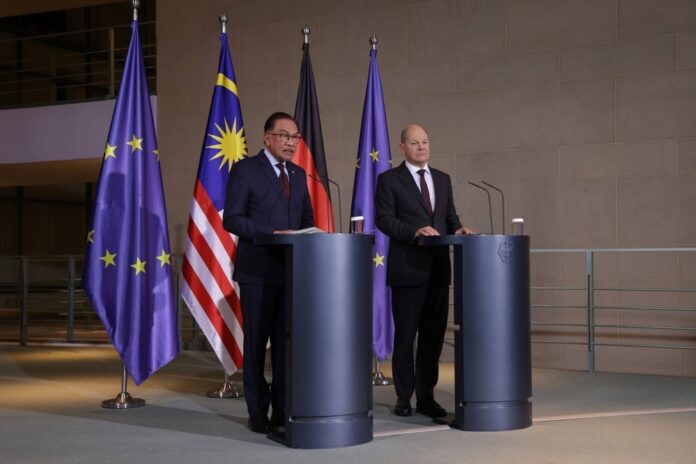German Chancellor Olaf Scholz wants to deepen economic ties with Thailand, Malaysia and the Philippines as Europe’s largest economy looks to diversify trade relations in Asia and become less dependent on China, according to Bloomberg.
Scholz will receive leaders of the three Southeast Asian countries for separate talks in Berlin this week in what close aides have described as a coordinated push to reduce one-sided dependencies on China and improve Germany’s economic resilience through more diverse supply chains and raw-materials partnerships.
Despite political efforts to pivot away from Beijing, China remained Germany’s most important trading partner in 2023 for the eighth consecutive year, and foreign direct investments of German companies in China reached a fresh record.
Major companies such as carmakers Volkswagen AG and chemicals manufacturers like BASF AG continue to look to one of the world’s most populous countries as a key market, and China still dominates the supply of raw materials needed to make electric-vehicle batteries, solar panels and other high-tech products.
Scholz on Monday discussed deepening ties with Malaysian Prime Minister Anwar Ibrahim in the areas of renewable energies and green hydrogen.
“We would like to expand this partnership further,” Scholz said Monday during a news conference with Anwar. “And of course, this also applies with regard to the objective of diversifying our economic ties around the world. We want to have good economic and political relations with many countries.”
Scholz praised Malaysia’s announcement that the nation would refrain from building new coal-fired power plants and instead invest heavily in the expansion of renewable energies.
Scholz will meet Philippine President Ferdinand Marcos on Tuesday and Thai Prime Minister Srettha Thavisin on Wednesday.
The talks with the three leaders will also focus on raw materials partnerships, closer cooperation on attracting skilled workers and deepening free trade, German officials said.
Scholz also wants to discuss the security situation in the Indo-Pacific region, Russia’s war in Ukraine and the conflict in the Middle East with his Asian partners.
Scholz’s ruling coalition last year passed a new China strategy calling on Germany’s biggest companies to make sure their risks in China are manageable as part of broader efforts to reset relations with the Asian superpower.
The document expanded on the government’s inaugural national security strategy, in which Germany stated that “elements of rivalry and competition have increased in recent years” with China. At the same time, though, Berlin described China as a partner in certain areas such as addressing global warming and other challenges.
Seeking closer ties with Asean partners will help Germany only partly in diversifying its business ties with China which has also to do with the sheer size of the respective economies: China is home to more than 1.4 billion consumers which is more than double of the 670 million people living in Asean countries.


